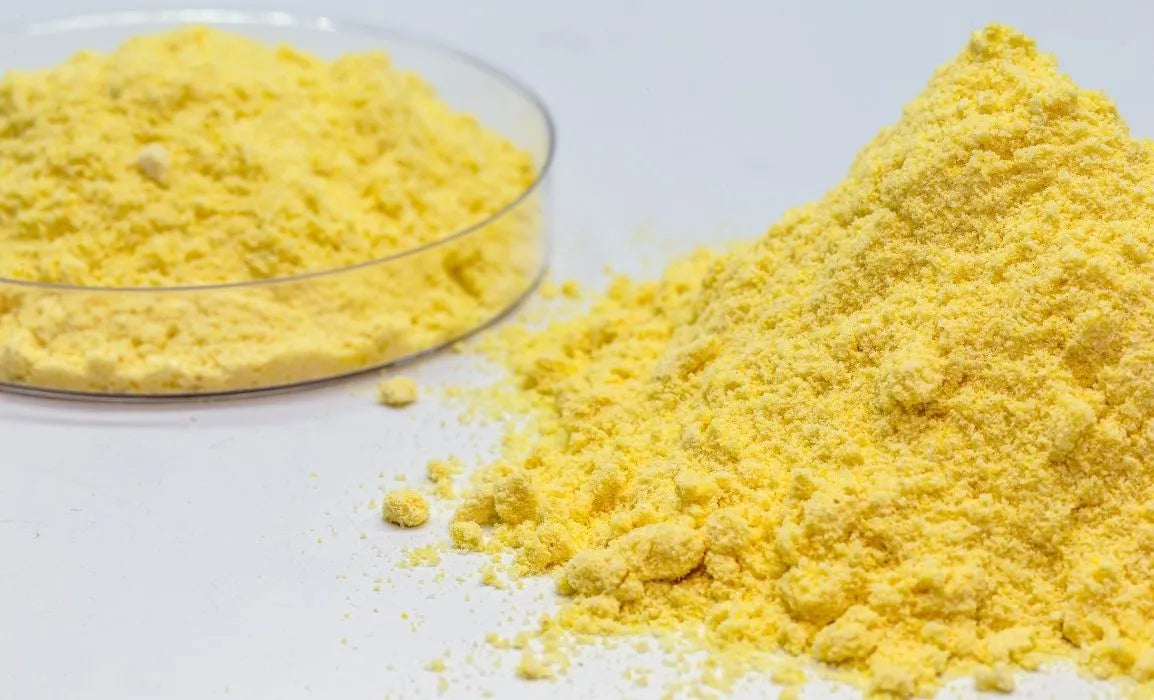Sulfur in skincare

Introduction
Sulfur is a natural element that is an essential component for all living cells. Due to its presence in rocks and minerals, sulfur is also abundant in plants and even the human body, in the form of amino acids, vitamins and even skin and hair. These substances contain sulfur, which lends them its characteristic yellow colour and unpleasant odour. The use of sulfur can be traced back hundreds of years as a medicinal ingredient, and in more recent times, it has been widely used as an acne treatment.
What is sulfur?
Sulfur has a bright yellow colour, and it exists in a form that is called an elemental substance. The appearance of sulfur is similar to a soft, loose, yellowish powder when at room temperature. It is found in living tissues and has many applications in some acne spot creams. It is also an exfoliator, apart from being antibacterial and antifungal.
What does sulfur do in skincare products?
Sulfur helps to relieve acne and deep inflammation associated with acne on sensitive skin. It can fight the skin's bacteria, making treatment faster. Sulfur acts as a keratolytic and reduces pore-clogging oil production. The mild exfoliating properties of sulfur make it a common treatment for acne, removing dead skin cells to promote smoother, clearer skin. The inflammation on the skin is calmed by sulfur's anti-inflammatory properties, which makes it suitable even for rosacea-prone skin conditions. Sulfur's main function is to dry out acne, accelerating the healing process of the pores, skin or even the entire face.
How to use sulfur for skin
To use sulfur on your skin in the right manner, it is best to first wash your face with a mild cleanser. Using the Overnight Acne Spot Corrector is advised when sleeping as this can enable the sulfur to drain oil, fight bacteria, and thus dry the pimples during sleep. After the treatment, it is also wise to put a light cream on the face to avoid dryness. Use the Dark Spot & Hyperpigmentation Serum for dark spots, in the morning or do it as part of your routine. Sunscreen is also a must-have for everyday use as sulfur can easily increase some sun sensitivity.
Sulfur benefits in skincare
Skin problems such as acne look unsightly and require consistent and effective treatment on a long-term basis in order to effectively control and prevent breakouts. The following qualities of sulfur are considered beneficial for its effectiveness in treating problems related to acne.
- Dries out blemishes: Since sulfur can dehydrate the affected regions, the sebaceous glands predominantly found within the area may stop excessive oil production. This helps in reducing acne and makes the skin feel smoother.
- Promotes exfoliation: Sulfur works to exfoliate and dissolve the impurities with its keratolytic properties. This essentially helps with eliminating dead skin cells, unclogging pores, and preventing acne.
- Fights bacteria: Sulfur has antibacterial properties, and it kills bacteria, fungi and various parasites.
- Treats sensitive skin conditions: Someone with any of these conditions - eczema or rosacea, may benefit from sulfur. It possesses anti-inflammatory properties and is helpful in softening and exfoliating thick, dead skin tissue, making it a very useful agent in acne, psoriasis or seborrheic dermatitis.
Precautions while using sulfur
Several precautions should be taken into consideration when you are using products containing sulfur. Some of them are mentioned below:
- Perform a patch test: Test a small area of skin before full application to check for potential allergic reactions or irritation.
- Start with low concentration: Use products with lower sulfur concentrations (3%-10%) initially to avoid irritation, especially if you have sensitive skin.
- Limit usage frequency: Begin with 2-3 times a week, gradually increasing if your skin tolerates it. Avoid daily use unless recommended by a dermatologist.
- Avoid mixing with strong actives: Don't use sulfur alongside other harsh ingredients like benzoyl peroxide, retinoids, or salicylic acid, which can cause excessive irritation.
- Watch for allergic reactions: Discontinue use if you experience severe redness, itching, swelling, or other signs of an allergic reaction.
- Avoid using on broken skin: Do not apply sulfur products to open wounds or inflamed skin, as this can worsen irritation or cause discomfort.
Conclusion
In conclusion, sulfur is a versatile and effective skincare ingredient, particularly well-suited for the treatment of acne and sensitive skin conditions such as rosacea and eczema. Its antibacterial, anti-inflammatory, and keratolytic properties make it a valuable tool in combating acne, unclogging pores, and promoting exfoliation. However, it is essential to use sulfur products with caution, starting with low concentrations and performing a patch test to avoid irritation or allergic reactions. When used properly, sulfur can significantly improve skin clarity and texture, making it a beneficial addition to skincare routines.

























































